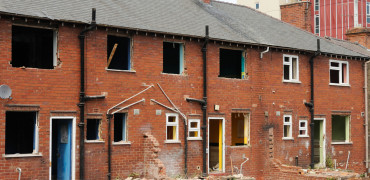At an event at Mitsubishi Electric’s Hatfield headquarters, just shy of 200 specifiers, architects, Housing Associations, housebuilders and heating engineers gathered to hear a passionate presentation from architect and TV presenter, George Clarke where he called on the housing sector to radically transform the way we build homes.
During his speech, Clarke called for an end to wet build. “You wouldn’t build a car out in the backyard, you’d build it in a factory and then you can ensure precision engineering in a way that is simply not possible outdoors,” he explained.
“Why can’t the same be true of building houses, where we can ensure the highest quality of materials and construction and then ship individual modules to site?
“This removes the timely wet processes such as bricklaying and plastering and means homes can be put together in days, rather than months.”
When it comes to homes we need to change our mindset
Exciting times ahead
In a blog post on Mitsubishi Electric’s ‘The Hub’ website, Clarke also stated “the way we build homes is quite slow, antiquated and doesn’t embrace fast, clean, precision-engineered and modern methods of manufacturing that other industries use.
It is the process that is medieval.
“Thankfully, things are beginning to change and factories are springing up around the country to begin an age of offsite, manufactured housing.
“Their industry is in its infancy and has a long way to go, but it has definitely started and exciting times lie ahead.”
How important is it that we change?
Ask those affected.
England is short of four million homes. There are at least 320,000 homeless people throughout Britain and over a million on housing waiting lists.
Coupled with travesty are our old dirty habits.
The UK construction industry is currently responsible for 45% of total UK carbon emissions, 32% of all landfill waste and is responsible for more water pollution incidents than any other industry.
There is good news though
The good news is that we have the knowledge, skills and technology to facilitate real change in the world, when we put our minds to it.
Implementing offsite construction into the housebuilding sector could be the catalyst.
One of the key factors that will either seal our reputation as innovators or sully it indefinitely is the materials we use and how we choose to use them.
The UK has a voracious appetite for housing that isn’t going away any time soon.
Staggering consumption
The construction industry is the largest consumer of natural resources in the UK today; a stark point that highlights just how high up on the agenda reconsideration of our building practices should be.
The impact of our materials usage on the environment in of itself is staggering; a recent report by Willmott Dixon Group suggested that the construction industry alone is accountable for around 45-50% of global energy usage, nearly 50% of worldwide water usage, and around 60% of the total usage of raw materials.
According to ‘The Waste and Resources Action Programme’, offsite construction can generate up to 90% less waste than traditional onsite building methods. This is largely because a factory is a much more controlled environment than a traditional building site - with far fewer variables.
Reuse
Modular construction offers a greater degree of reusability; buildings can often be disassembled and moved to another site entirely if necessary. They can be shifted and repurposed when required. However, should a modular building find itself no longer fit for requirement as it stands, many of its components can be salvaged and re-used in another project, reducing the need for fresh new materials in each new build.
This reduction in materials usage protects depleting stock of resources whilst simultaneously lowering waste.
Offsite construction is far less energy intensive than traditional housebuilding methods. The carbon footprint left by the many construction vehicles and machinery on the site of a traditional construction project alone is considerably larger than that of modular construction.
Put simply, fewer vehicles involved and less time spent on site results in less greenhouse gases being released into our environment.
Leading the way
In a recent report published by the Sustainable Energy Association, entitled 'Net-zero pathway for social housing' Chief Executive Lesley Rudd said "There is a real opportunity for the social housing sector to lead the way in reaching net-zero, but to take advantage of that opportunity, stable and consistent policy together with funding support is required.”
Summary
George Clarke puts it this way; “It has taken us a long time to change our mindset with regards to cars, fossil fuels and emissions and we are getting there but we all still see dirty, polluting cars on our roads every day.
When it comes to our homes, we have hardly started and we need to now!”
Let’s change the way we build houses for the better.
Joe Bradbury is editor of Housing Association magazine



